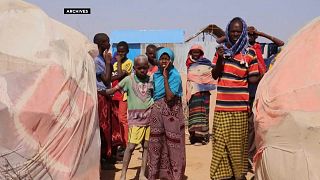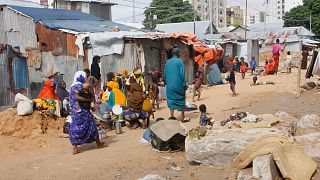Somalia
The United Nations humanitarian chief has called for an urgent need for at least $1 billion to avert famine in Somalia in the coming months and early next year.
Two more dry seasons are expected to compound the historic drought that has hit the Horn of Africa nation.
Martin Griffiths said on Tuesday in a video briefing from Somalia's capital Mogadishu that a new report from an authoritative panel of independent experts says there will be famine in Somalia between October and December "if we don't manage to stave it off and avoid it as had been the case in 2016 and 2017."
The undersecretary-general for humanitarian affairs told U.N. correspondents that more than $1 billion in new funds is needed in addition to the U.N. appeal of about $1.4 billion. That appeal has been "very well-funded," he said, thanks to the U.S. Agency for International Development, which announced a $476 million donation of humanitarian and development aid in July.
The Famine Early Warning Systems Network, created by USAID, said in a report Monday that famine is projected to emerge later this year in three areas in Somalia's southeastern Bay region, including Baidoa without urgent humanitarian aid.
Up to 7.1 million people across Somalia need urgent assistance to treat and prevent acute malnutrition and reduce the number of ongoing hunger-related deaths, according to a recent analysis by the Integrated Food Security Phase Classification, used by the network to describe the severity of food insecurity.
The Horn of Africa region has seen four straight failed rainy seasons for the first time in over half a century, endangering an estimated 20 million people in one of the world's most impoverished and turbulent regions.
Griffiths said meteorologists have predicted the likelihood of a fifth failed rainy season from October to December, and a sixth failed rainy season from January to March next year is also likely.
"This has never happened before in Somalia," he said. "This is unprecedented."
"We've been banging the drum and rattling the trees trying to get support internationally in terms of attention, prospects, and the possibilities and the horror of famine coming to the Horn of Africa -- here in Somalia may be first, but Ethiopia and Kenya, probably they're not far behind," Griffiths said.
He said the U.N. World Food Program has recently been providing aid for up to 5.3 million Somalis, which is "a lot, but it's going to get worse if famine comes." He said 98% of the aid is given through cash distributions via telephones.
However, many thousands are not getting help, and hungry families in Somalia have been staggering for days or weeks through parched terrain in search of assistance.
Griffiths said a big challenge is to get aid to people before they move from their homes, to help avoid massive displacement.
Many Somalis raise livestock, which is key to their survival, but he said three million animals have died or been slaughtered because of the lack of rain.












02:30
Morocco’s oases struggle to survive amid growing desertification
01:24
South Sudan: World Food Programme airdrops food, warns of famine
01:00
Hamas gives 'positive' response to 60-day ceasefire proposal but says talks needed on implementation
Go to video
In Kenya, 90% of packaged food needs health warning label under new rules
01:39
Driven to starvation, Sudanese eat weeds and plants to survive
01:42
Gaza residents welcome rare organized aid delivery after months of chaos and hunger